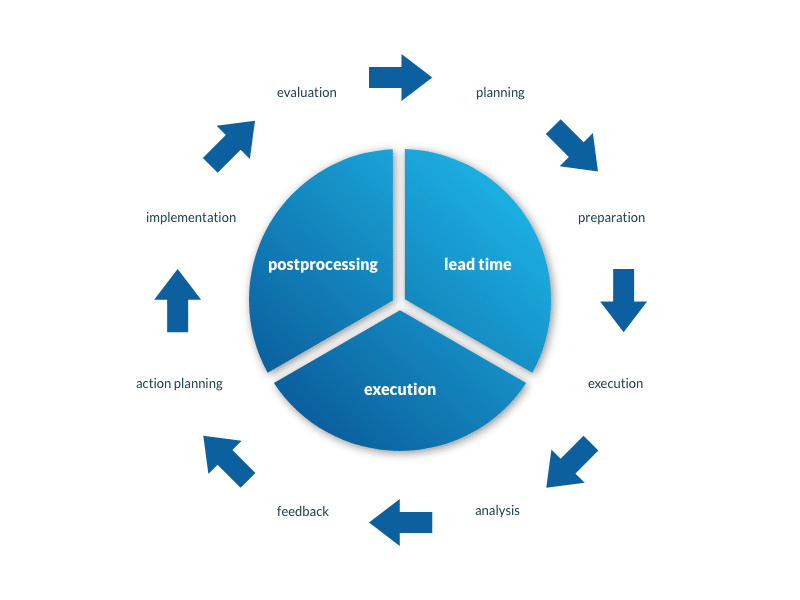As the body representing the interests of the employees, it will critically scrutinize the employee survey. The works council is an important body.
Not only does it have extensive rights with which it can limit the power of management, but it is also an important multiplier.
In this article, you will learn when the works council can enforce co-determination, participation and consent rights when conducting an employee survey and why it is so important to have the works council on your side right from the start.
In addition, by the end of the article you will have a concrete idea of how you can specifically involve the works council in employee surveys.
With this in mind, happy infotainment!
Why is it important to involve the works council in the employee survey at an early stage?
Imagine you publish a survey and no one participates. The worst-case scenario!
In any employee survey, the key to success is to gain the acceptance of all parties involved: employees, managers and the works council.
Why is the works council so important?
The works council is an elected representative of the employees’ interests. Its task is to protect them from possible arbitrariness on the part of the employer. It is therefore also its duty to ensure that the employee survey cannot result in any disadvantages or risks for the workforce.
If you have the works council on your side, you have gained the most valuable advocate for your survey in terms of employee acceptance.
>> Video: Increase acceptance of employee surveys <<
In addition to this “internal marketing factor,” the works council also has a legally enshrined right of co-determination under certain conditions. For example, when it comes to ensuring anonymity and data protection.
Leaving the works council out of the planning of an employee survey would be unwise for three reasons:
- You alienate a valuable advocate.
- You risk unwanted delays, in the worst case even the standstill of the project.
- You send the signal of a lack of appreciation.
I would also like to mention the last point, because the members of the works council are committed to the well-being of the employees on a voluntary basis – usually with a high level of time commitment and a lot of heart and soul. This deserves recognition.
Tasks and function of the works council
Before we delve deeper into the topic, I would first like to present in a highly simplified form what the tasks and functions of the works council are. This will make it easier for you to mentally walk in the shoes of this stakeholder group and “pick them up” properly.
The works council is elected by employees to represent their interests vis-à-vis the employer and to work to enforce their rights.
The members of the works council do this on a voluntary basis, free of charge and out of personal conviction for a good cause.
For example, the works council must ensure that the employer complies with the statutory regulations, collective agreements and works constitution law.
It also has the task of receiving suggestions from employees, promoting their interests in the company and making them known to the employer.
In addition to these monitoring, structuring, protection and promotion tasks, the works council has the duty to exercise its co-determination and participation rights.
We speak of participation rights whenever the works council is entitled by law to request information from the employer in order to be able to exert influence in a joint discussion.
We speak of co-determination rights when the employer needs the works council to make its decision.
These are, on the one hand, matters of social co-determination – from the regulation of behavior in the company to working hours, vacation regulations and questions of wage formation. The works council’s consent is also required for hiring, transferring, grouping in or regrouping.
Last but not least, the works council has the right to be heard when a notice of termination is issued. If this is ignored, the termination is invalid. As already written, this is a highly simplified presentation of the rights and obligations. My aim here is not so much to give you a complete account, but rather to give you an initial insight into this complex topic.
Especially important is the fact that the rights of the works council are not a nice-to-have! Every right is also a responsible task for the works council, which it is obliged to fulfill by law.
Whenever the works council asks you uncomfortable questions, it is not doing so to pester you or to make itself important, but as part of its duty.
I think keeping this in mind will help you to deal with the works council smoothly.

Rights and intervention options of the works council in the context of the employee survey
An employee survey is usually commissioned by the management or personnel department with the good intention of making improvement potentials transparent.
Although this is certainly in the interest of the employees, the question arises as to what rights the works council has in this context. Does it have to be involved in the employee survey by law?
If so, in what form – and what can I expect in the worst-case scenario if I bypass the works council? Important questions, all of which are regulated in the Works Constitution Act.

Co-determination, consent or information – what rights does the works council have when conducting an employee survey? Let’s take a look at the legal situation:
The works council has a right of consent when personnel questionnaires are used in which employees answer questions under their own names. In Germany for example, this is regulated in §94 of the Works Constitution Act.
In plain language: If data is not collected anonymously, the works council must be asked. In this case, the survey may not be conducted without its consent.
If you were to ignore this, the works council could obtain an injunction and even prevent the results of the employee survey from being used.
In addition to the right of consent under Section 94 of the Works Council Constitution Act, the works council has a right of co-determination as soon as the survey questions concern the following areas:
- Situation of the employees in the company and the working atmosphere
- Order of the company or work organization
- Vacation arrangements
- Working hours
- Salary and wage structure
- Technical equipment for monitoring behavior and performance
- Company suggestion scheme
- Occupational safety
- Health protection
- Social facilities
I have simplified the list for better understanding. The exact legal wording can be found in the Works Constitution Act §87. Each country has its own laws regarding the works council, so the laws of the country concerned must be considered.
As soon as you ask questions about one of the above-mentioned topics, the right to information automatically comes into play.
It states that the works council must be informed in a timely and comprehensive manner. This means that the works council should definitely see the results of the employee survey before the workforce does.
Unfortunately, there is no general answer to the question of whether the works council actually has a right of co-determination in the design and implementation of the employee survey.
Each individual case must be considered critically. The decisive factor is the consequences that result from the results of the survey for the employees.
As a conclusion of the whole legal consideration I can state: In voluntary and anonymous form, it is theoretically possible to conduct an employee survey without the consent of the works council.
However, you will probably not be able to avoid the works council’s right to information anyway, since questions on the topics covered by §87 are usually highly relevant.
You can make things much easier for yourself if you see the works council not as an opponent, but as an important partner. After all, you are in the same boat.
Apart from that, an employee survey without the full support of the works council will not achieve the same acceptance among the respondents as a survey that is co-designed and supported by the stakeholders.
Use the works council as an important multiplier and involve it in good time.
What questions will the works council ask regarding the employee survey?
With priority A, the works council will want to clarify whether it has consent, co-determination or information rights with regard to the planned employee survey, or whether employees must be protected from disadvantages and risks resulting from participation in a planned employee survey.
If you are planning an employee survey, you should therefore be well prepared for the following questions from the works council and have confident answers at the ready:
1. What are the goals of the employee survey?
An employee survey must never be a question of pure self-purpose or actionism. Optimally, you try to clarify a concrete question. Of course, the works council wants to know these goals and intentions behind the survey.
The works council acts as an advocate for the employees and wants to protect them from disadvantages and risks. Therefore, he will not only be interested in the objectives, but also in the possible actions that could follow the survey.
2) How do you ensure the anonymity of the employee survey?
As already explained in the previous paragraph, the preservation of anonymity plays a major role for the works council!
By the way, this does not only apply to the works council, but of course also to the employees. Only if you ensure anonymity will your survey meet with acceptance.
Conversely, this means that if the senders fear that their answers could be traced back to their identity, they will either not participate or they will give answers that management would avoid hearing.
For this reason, it has proven successful for many companies to commission an external service provider with the technical implementation of the survey, or to use an online service such as easyfeedback.
3) How do you ensure technical data protection in accordance with the GDPR?
If you conduct the employee survey anonymously, you do not collect any personal data. This means that the survey does not fall within the scope of the GDPR. However, you must ensure 100% anonymity technically and practically.
In paper form, this is not a problem; if the sheet is handed in without a name, no connection can be made retrospectively between the answers and the sender.
Today, however, most employee surveys are conducted in electronic form. This is much more efficient and can be carried out securely and quickly with the help of professional online portals.
If you also opt for the electronic variant, make absolutely sure that the functionality of the technical equipment 100 percent rules out the possibility of anonymity being undermined.
For example, if the survey is carried out via the company’s own IT system, there is usually a technical interface between the personal data and the responses.
In this case, according to case law, the works council has a right of consent and can veto the survey. This problem is another argument in favor of using a professional online platform or commissioning a service provider.
>> Video: Include privacy notices in surveys with easyfeedback <<
4. Which IT system or online portal do I use to conduct the survey?
If you decide to use a service provider for the reasons just mentioned, you should provide the works council with all the important information.
The service provider should ensure data protection in accordance with the GDPR. This includes, as in our example for Germany, the certified server location in Germany (ISO27001), data encryption from the beginning, ensuring anonymity, multi-client capability of the system and maximum protection against unauthorized access.
A reputable service provider will provide you with this information without being asked, or will publish its quality standards on its website. Ideally, there is a personal contact person with whom the works council can get in touch to clarify any open questions.

How can my template for an employee survey be accepted by the works council?
A template for an employee survey that is also supported by the works council should take various aspects into account:
- Coordination of content:
The questions should be created in collaboration with the works council to ensure that relevant topics and employee concerns are addressed. - Legal framework:
The questions should comply with legal requirements and must not contain any sensitive or discriminatory content in order to protect employee privacy and personal rights. - Participation of the works council:
The works council should be actively involved in the process and have the opportunity to analyze the results of the survey and derive measures together with the company management. - Communication and transparency:
Employees should be informed about the purpose and process of the survey and it should be made clear that their participation is voluntary and anonymous. - Evaluation and implementation:
The results of the survey should be evaluated together with the works council and concrete measures should be developed to improve working conditions and the working atmosphere.
A good template for an employee survey that is supported by the works council should therefore take into account both the interests of the employees and the legal and organizational framework conditions.
The intersection of goals and motivation – reaching the goal with common ground!
Together you can reach your goal faster – provided there is agreement on exactly where the goal is. What is the goal of an employee survey?
In the case of the employee survey, the goal is usually to positively change the current state and to further develop the company. This almost always results in benefits for the employees. This is precisely the common basis for cooperation with the works council.
Since the works council is the employees’ friend and helper, it can most likely live well with this intention. You should clearly point out the intended benefits for the employees.
In general, you can always emphasize the importance of participation, communication and feedback culture to the works council. An employee survey is always a positive signal in this respect.
But there are also goals in terms of content that the works council will support if you communicate them wisely.
Let’s take a look at the three most common goals of an employee survey and see what benefits we can derive for employees:
Rank 1: Engagement and commitment
Employee surveys are most commonly used to analyze and improve engagement or commitment in the workforce.
Employee engagement tells you how committed employees are to their work and how motivated they are to help achieve company goals.
If employees are engaged, the company benefits from higher productivity. The intensity of engagement is also a key indicator for determining employee emotional commitment.
Determining or desiring to improve engagement and commitment does not conflict with the goals of the works council – quite the opposite!
The company benefits from higher productivity and lower fluctuation – but must invest in attractive measures to achieve this: for example, improving working conditions, making activities more varied, creating more transparency, optimizing the work-life balance and training managers.
Therefore, the win-win factor is high! Clearly outline the benefits of the possible measures for the employees in dialog with the works council and you will probably find yourself knocking on open doors.
Rank 2: Change – shaping change together
In times of growing and rapidly changing markets, a company’s ability to change and remain agile is a key success factor.
Change can only succeed if everyone involved pulls together. The works council also has an interest in ensuring that employees do not become passive victims of change processes.
Make it clear to the works council that the information from the survey is intended to help employees become active participants.
As part of the survey, you can ask for their thoughts, concerns and worries and incorporate them into the process. As the representative of the employees’ interests, the works council will most likely share and approve of this goal.
Rank 3: Specific surveys
Of course, surveys are also possible as part of special projects or isolated measures. For example, if the success or efficiency of internal development programs is to be examined and, if necessary, optimized as part of ongoing monitoring.
In this case, focus on transparency and inform the works council about the goal of the measure. Present the benefits of optimization from the employees’ perspective.
If the survey shows that progress is being made in the relevant areas, for example, this is a positive signal to the workforce. They will be pleased to see that their own efforts are bearing fruit.
If stagnation is detected, blockages such as poor working conditions, inadequate communication or other problems could be the cause. This is not only bad for the efficiency of the measure, but also stressful for the employees.
With your employee survey, you can get to the bottom of these stressors and develop effective countermeasures. The works council will go along with this!
Transparency and appreciation in dealing with the works council – this is how communication around the employee survey succeeds
Since the employee survey is usually commissioned by management, you primarily represent their interests in the organization and implementation of this project. However, this does not make the works council your opponent.
You both depend on communication to work. It is even stipulated in the Works Constitution Act that the works council and management should work together in a spirit of trust. This can only be achieved with mutual respect and appreciation.
If you want to specifically involve the works council in the employee survey, the following rules will help you in dealing and communicating.
1. Encounter at eye level
The works council is an equal negotiating partner – you should see and treat it as such. Pay attention to your inner attitude.
Perhaps you feel that the works council is too dominant? Then keep in mind that the works council is obligated to enforce its co-determination rights. They have a great responsibility to the employees.

2. Open, fact-based communication
Honesty is paramount. Provide the works council with all information and play your cards right from the start.
3. Good interview preparation
It will help you to be well prepared in advance for all the questions the works council will ask you about the employee survey.
Before the interview, put yourself in the works council’s perspective and plan your interview with empathy and focus on your common goals.
4. Reliability
Stand by what you say and keep agreements, deadlines and promises reliably. This is the only way to earn and maintain trust.
5. Remain in exchange
Involve the works council in the employee survey and stay in contact with them. It will be a valuable advisor in many areas. Use their know-how and inform them in good time about all important steps and developments.
Involve the works council in the individual phases of the employee survey
Now you are probably asking yourself in which phases of the employee survey you should specifically involve the works council.
As a rule, the employee survey is divided into eight phases:
- Planning
- Preparation
- Implementation
- Evaluation
- Feedback
- Action planning
- Implementation of measures
- Evaluation

You should involve the works council in the employee survey as early as the planning phase. This is essential for acceptance among the workforce.
Depending on the topics of the survey, you should also consider other interest groups, such as the equal opportunity representative, company health management or the trainee representative.
If you decide to use an external service provider, such as easyfeedback, for the employee survey, you should inform and consult the works council. You can confidently refute critical questions or concerns in dialog.
The works council should also be involved in the preparation phase, especially in the development of the questionnaire. The questionnaire is the heart of the survey and its interest in cooperation will be correspondingly high.
Also coordinate the information letters for internal communication with him.
It is even better if the works council informs the employees again separately and calls on them to participate. This strengthens trust in the measure, reduces fears and optimizes the response rate.
As soon as you have the results, you should discuss them with the works council. Do this in good time, i.e. before you give the respondents their feedback.
The works council should always be involved in planning the measures derived from the results of the employee survey.
Tip:
Discuss the entire project process with the works council at the beginning and determine together in which phases active participation is desired and where information is sufficient. This will prevent misunderstandings.
Conclusion
Even if the works council’s right to participate in anonymous and voluntary employee surveys is not mandatory by law, you should get the works council on board right from the start.
The works council represents the interests of the employees. If you want them to accept the survey, you also need the works council’s support. In this way, you not only increase the chance of a good response rate, but also reduce the risk of unwanted delays or even a standstill due to inventions.
It is therefore always a good decision to involve the works council in the employee survey from the very beginning.
In doing so, you should focus on appreciative communication and transparent information. Focus on what connects you. Use the power of the works council as an important multiplier and advocate.
Good luck with the joint implementation!




